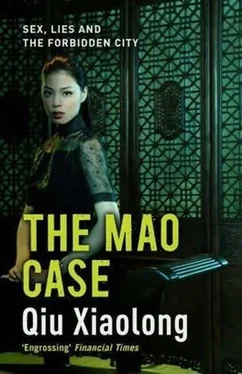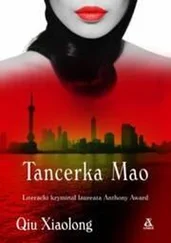“I’ll need to use your fax machine. Someone will fax something here,” he said, starting to copy the number.
“No problem, Comrade Chief Inspector,” the gray-haired man said. “We know you.”
He called Peiqin on his cell phone, wiping the sweat from his forehead. “Are you still at Jiao’s apartment, Peiqin?”
“Yes, I’m leaving.”
“Leave the key under the doormat when you go.”
“What?”
“Yes, and don’t tell anybody about it.”
“No, I won’t.”
“Fax your list to this number in five minutes.”
“I will.”
The moment he finished with Peiqin, he called Gu. “I need your car for the night. It’s a new Mercedes, right?”
“It’s yours, it’s a Mercedes, 7 Series. Did you find out anything at the cocktail party, Chen?”
“Have your chauffeur pick me up at Bund Park in ten to fifteen minutes. I’ll explain it all to you later, Gu. I appreciate all that you have been doing for me.”
“You don’t have to explain anything to me, nor to thank me for it. What’s a friend for?”
Since their first acquaintance during another a case somewhat related to the park, Gu had declared himself a friend to the chief inspector, and he acted like one too. A shrewd businessman, Gu might have seen Chen as a valuable connection. On several occasions, however, Gu had generously exerted himself.
“whatever you are going to do,” Gu went on, “you aren’t doing it for yourself, that much I know.”
Chief Inspector Chen was going to do something he had never done before, that was about all he knew. He had to be there himself – in Jiao’s room.
It wasn’t like the visit to Mao’s room, Mao being dead such a long time.
Beside him, the fax machine reeled out a piece of paper.
WHEN CHEN ARRIVED AT Jiao’s apartment complex, it was almost five in the afternoon.
He sat in the car backseat without even bothering to roll down the window to speak to the security guard. In his experience, they would browbeat an ordinary-looking person lingering in front of the gate, but at the sight of a brand new Mercedes, they would bow and open the gate wide.
As he anticipated, an elderly security man let the car in without asking any questions.
“Pull up at the end of the subdivision,” Chen said to the driver. It was a high-end subdivision, with luxurious cars parked here and there. Security might have taken him for one of the new residents. “You may leave if I don’t come back in fifteen minutes.”
The driver, who must have been instructed by Gu to follow Chen’s orders unconditionally, nodded vigorously like a robot.
He stepped out and started back to the building in which Jiao lived, strolling like a resident.
Walking into the building with its door open, he took the elevator to the sixth floor, one floor above Jiao’s. Seeing no one along the corridor, he put on a hat and a pair of sunglasses he had purchased at the park. Then he headed to the stairs. He had no idea where Internal Security had installed their video camera, possibly it was hidden somewhere over the landing, but they wouldn’t easily recognize him in this disguise. Nor probably would they be watching the camera twenty-four hours a day. whatever happened tomorrow, he didn’t want to worry about it now.
In front of Jiao’s door, he squatted down, pretending to tie his shoelace, his back to the staircase and his body covering the view of the doormat, under which he fumbled until he touched the key.
In his college years, he’d read a story about Sherlock Holmes breaking into a criminal’s room with the help of a maid working there. If Holmes could justify the means by the end, so could Chief Inspector Chen.
It was no longer just a matter of damage to Mao’s image – whatever the Mao material there might be. He was simply making one more effort, so he wouldn’t end up like Old Hunter, forever plagued by the thought of what he should have done.
Inserting the key into the lock, he let himself into a large, luxurious apartment. Thanks to the observations made by Peiqin, the basic layout was already familiar to him.
He didn’t start searching the place like a cop, though. There was no point in turning it upside down. Internal Security would already have done a thorough job – he had little doubt about who was behind the mysterious burglary here – and he wouldn’t have better luck. Nor did he have the time. So he tried to focus instead on the list of the “unusual” items Peiqin had faxed him.
The studiolike appearance of the living room was no surprise. Jiao was a hard-working girl, and she was free to use the room whatever way she liked. The first object that caught his attention there was a long scroll of poetry on the wall. He recognized the poem as one entitled “An Imperial Concubine Waiting at Night” by the Tang-dynasty poet Li Bai.
Waiting, she finds her silk stockings
soaked with the dewdrops
glistening on the marble palace steps.
Finally, she is moving
to let the crystal-woven curtain fall
when she casts one more glance
at the glamorous autumn moon.
Chen was confused. Diao had told him about a scroll of classical Chinese poetry in Shang’s room. Not by Li Bai, but by somebody else, though alike in that they were on the persona of a neglected imperial concubine. What he had discussed with Diao wasn’t top secret, and as Shang’s granddaughter, Jiao might have heard or read similar versions. Why she should have chosen to hang the scroll here, however, was another mystery. The poem would have made sense for Shang, but not for a young girl like Jiao.
Not far from the scroll, he saw several paintings, finished and unfinished, stacked against the wall. Among them, he picked out a sketch of the flying witch. Possibly a draft containing some details Xie hadn’t mentioned. The witch was flying on a short-shafted broom over the Forbidden City. There were also two lines written underneath the picture. Oh to sweep away all the bugs, / I’m invincible! Chen recognized them as by Mao. Was the painting meant to be a parody?
Moving into the bedroom, he noticed the large bed with one third of its space covered in books. It reminded him of his visit to Mao’s bedroom. Was it an elaborate imitation? He touched the bed. Sure enough, it was a wooden-board mattress.
So he opened the door to the bathroom. The sight of the double toilet seats – a normal toilet seat for one to sit on, and a lower, basin-like seat for one to crouch over – confirmed his suspicion. For Mao, it had been a habit carried over from his days as a farmer in the Hunan Province, but Jiao was a girl born and raised in Shanghai. While the orphanage wasn’t a fancy place, there was no way Jiao would have picked up such a habit in the city. Besides, it would have been expensive to have her place designed like that.
And Jiao hadn’t traveled to Beijing – not before she moved in here. How could she have gotten the ideas and then incorporated them into the interior design?
Once again he took out Peiqin’s list of the “unusual.” The next on the list was the nature of the books in the study. But what had baffled Peiqin didn’t baffle Chen, thanks again to his visit to Mao’s old home. He didn’t even have to check all the books. A quick look at a couple of titles convinced him that they were similar to the ones in Mao’s study.
He moved back to the bedroom. Standing by the window, he tried to empty his mind of all thoughts, closing his eyes and taking a long deep breath.
When he reopened his eyes, he let his gaze sweep around the room, effortlessly, as if still in meditation. And his eyes fell on the black-lacquered cinerary casket on the nightstand.
It wasn’t something marked as “unusual” in Peiqin’s list. It wasn’t something that was commonly kept in a bedroom, but it wasn’t unimaginable for a filial daughter to keep her mother’s casket there. But how could Jiao have had the casket? When Qian died, Jiao was hardly two years old.
Читать дальше












